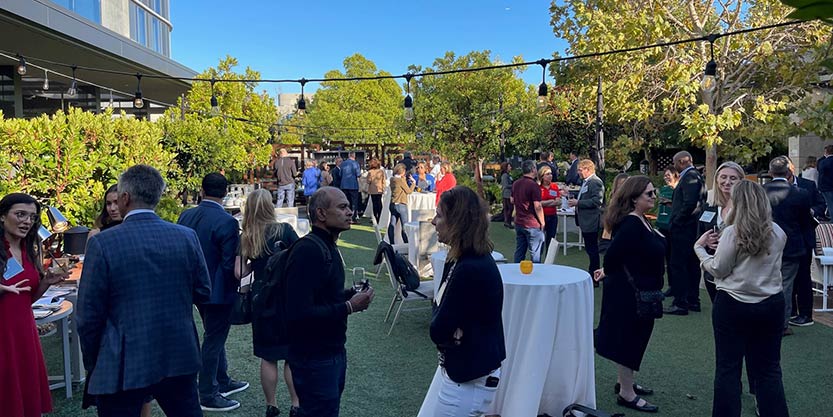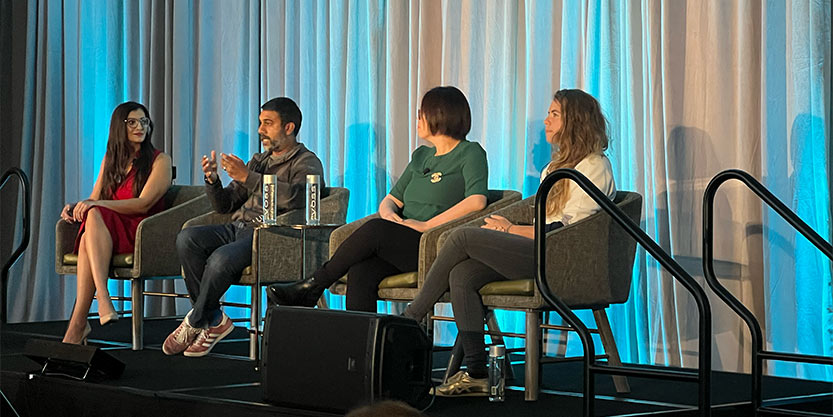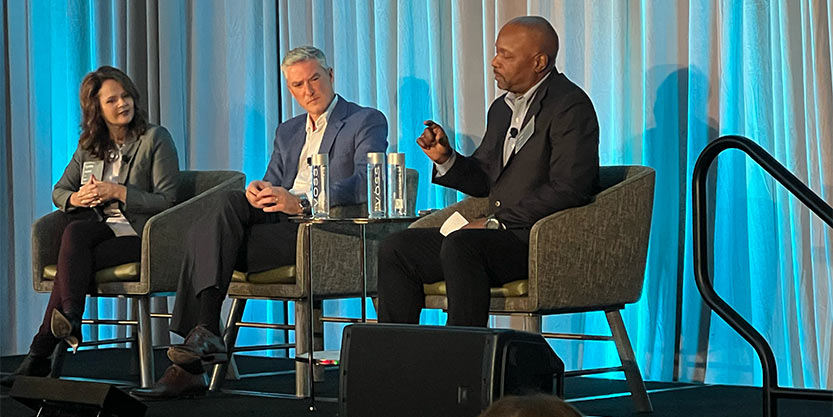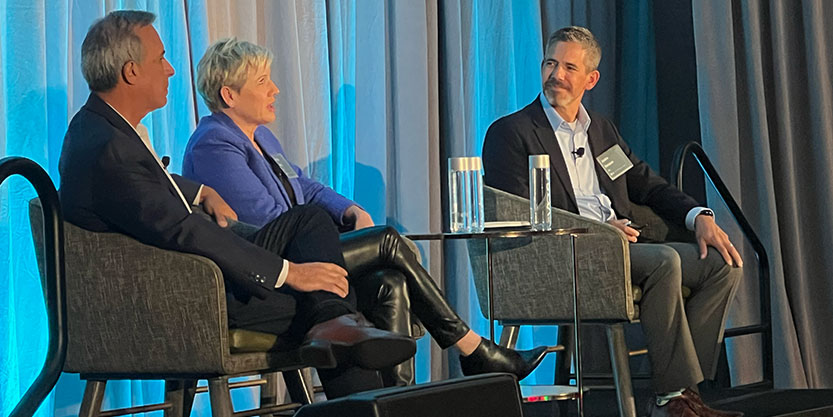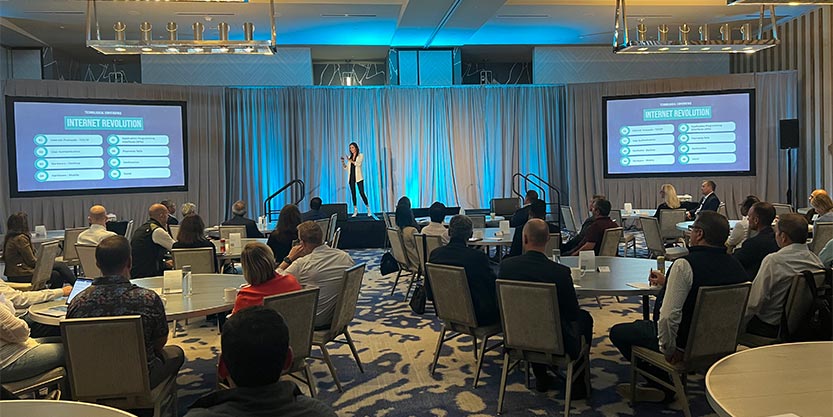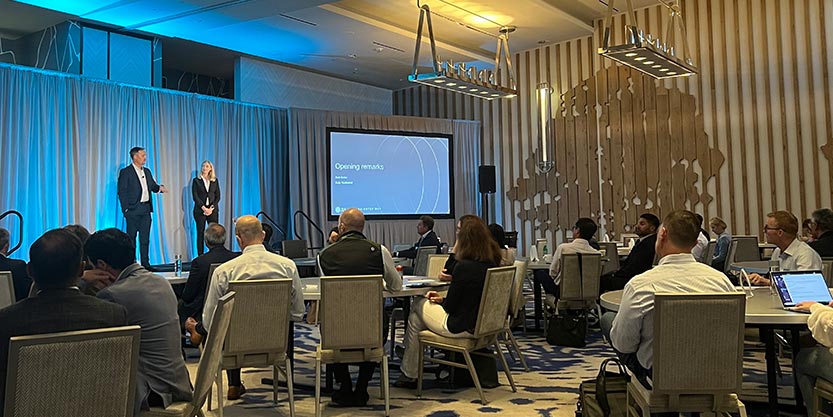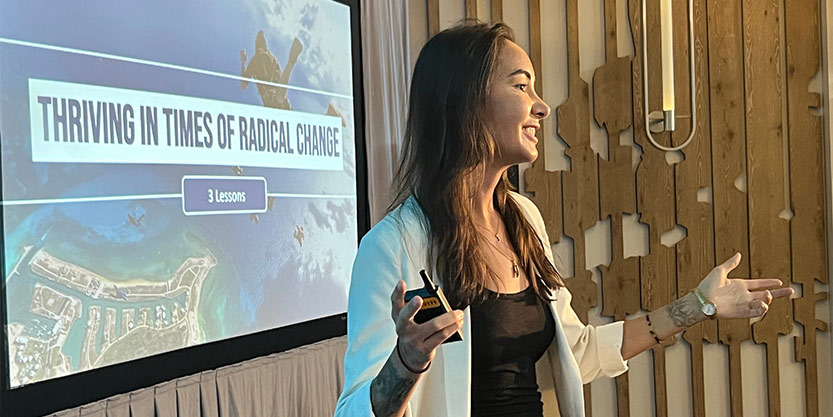What’s the future of tech & AI in the built environment?
Real estate leaders from across the tech sector gathered at JLL’s Technology Executive Forum to discuss the future of the built environment.
With increased pressure to balance operational efficiencies with spaces and experiences that support employees, businesses spanning the technology sector are facing new challenges – and opportunities. While some tech companies previously focused on scaling, innovative workplace design and human experience, companies from all subsegments of the tech industry are now striving to reduce costs while attracting and retaining top talent, achieving ESG goals, and ensuring safe and productive facilities.
What hasn’t changed is that leaders in tech want to know what their peers – or competitors – are doing. To gain insight on trends, best practices and AI’s impact on commercial real estate, leaders from across the industry gathered at JLL’s first Technology Executive Forum. The event featured networking, a futurist keynote speaker, panels of industry trailblazers and a fireside chat with JLL C-suite leaders.
Panel | Leading tech industry CRE organizations into the future
To start the conversation among industry leaders, Justin Kenyon, Managing Director for the Technology Division, JLL Work Dynamics, led a dialogue with Mike Huaco, Senior Vice President of Real Estate and Workplace at Synopsys, and Melissa Myers, Head of Global Workplace and Safety at Okta, about how technology sector companies are adapting their spaces to meet growth and headcount goals.
Their discussion revealed that through increased focus on data analytics, leaders in technology industry real estate are gaining critical insights on how people are using workspaces and concentrating on talent acquisition and site locations.
“What we're trying to do is look at what's important to the organization—and that is talent,” Huaco said. “Where are we going to hire? Really focusing on hiring the right talent in the right location.”
Myers agreed, affirming people, productivity and place are all fundamental to operational success, so CRE leaders are shifting “to focus on our whole business. Now we're understanding that workplace plays a critical role.”
Segue | Chipping into the future of CRE: semiconductors & tech manufacturing
John Leddy, Managing Director for the Technology Division, JLL Work Dynamics shared that with the acceleration of AI capabilities and PropTech analytics, the forecast looks bright for growth in both advanced tech manufacturing and semiconductor companies. Leading CRE trends within these tech segments are optimizing portfolios, increasing capital investments, and expanding sustainability.
Fireside chat | Dynamic delivery: The future of real estate
C-suite leaders confirmed top-performing tech companies are adapting to evolving workplace dynamics to thrive through economic uncertainty and drive operational success. Neil Murray, Global CEO of Work Dynamics at JLL, Cynthia Kantor, Chief Client and Growth Officer at JLL, and J. Corey Lewis, Senior Director of Workplace Services at Google Americas, provided insight on the needs and trends shared by JLL’s Global Client Advisory Board.
The resounding feedback from CRE leaders in tech: embracing DEI and organizational culture is vital for future growth. As the industry progresses, diversity is key within the workforce and in the way the organization approaches processes and problem-solving.
Panel | How AI is transforming the built environment & the future of work
Empowering people with technology was a recurring theme in conversation at the Forum. As AI adaptation increases across industries, including real estate, the opportunities and ways of working continue to change. AI is transforming CRE in the built environment as a tool to improve productivity and efficiency. Investments in AI development also continues to rise.
Exploring AI innovations from a developer, investor and UX perspective, Sonia El-Sherif, Chief of Staff at JLL Spark led a conversation with Jeevan Kalanithi, Founder and CEO of OpenSpace, Maryana Saenko, Founder and Partner of Future Ventures, and Yao Morin, Chief Technology Officer at JLL.
The panel delved into the ways in which AI is shaping various aspects of business operations, including the return to the office, portfolio analysis, workflow tracking, and cost savings. Additionally, AI tools empower us to discern helpful insights without deep expertise in the data.
Morin highlighted how AI is useful for processing messes of raw data. “It has always been a very big challenge to extract information in an effective and scalable way,” she affirmed. “Data is being unlocked and can be used effectively now. This is going to benefit the entire CRE industry.”
“Technology has a pretty bad understanding of what's going on in the physical reality, because it can't sense it,” Kalanithi said. “And even if it could, it can't organize it…. There are huge opportunities for the advent of the confluence of sensors and being able to actually organize that information so people can process it into answering questions that people want answers to – which is going to lead to better transparency and accountability because you can build on that. It’s very exciting.”
Focusing on the future
Regardless of how people utilize AI in the coming years, it will have a profound impact on the real estate industry, shaping the way we work and how we interact with the built environment.

